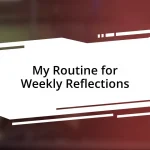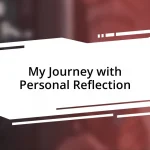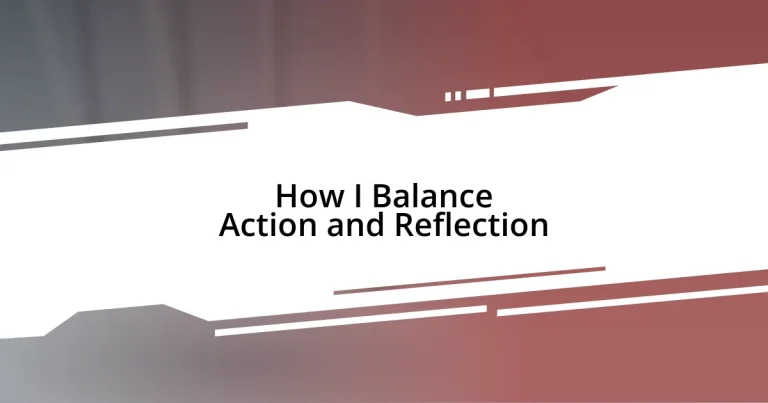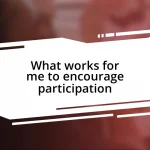Key takeaways:
- Action and reflection are crucial for personal growth, helping align goals and prevent burnout.
- Effective action requires setting specific, manageable goals and embracing imperfections.
- Deep reflection techniques, such as journaling and mindfulness meditation, enhance understanding of experiences.
- Integrating reflection into daily routines can lead to valuable insights and motivation for ongoing personal development.
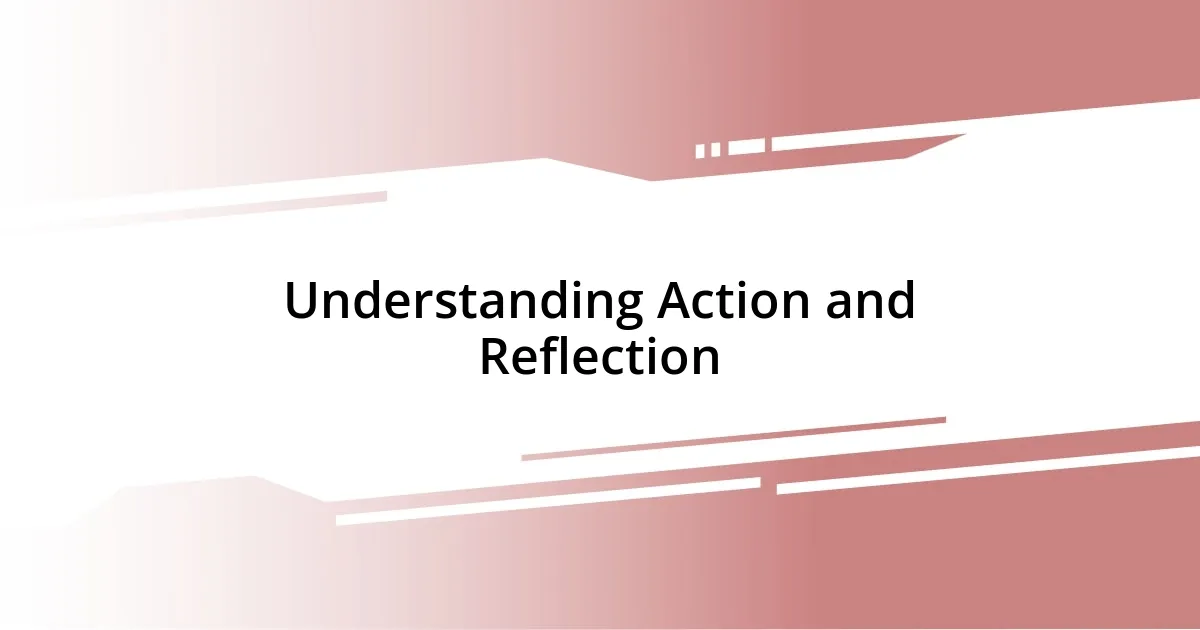
Understanding Action and Reflection
Action and reflection are like two sides of the same coin, each essential for personal growth. I remember a time when I rushed into a project, filled with enthusiasm, only to realize later that I hadn’t considered all angles. Have you ever jumped into something only to pause and think, “What was I really trying to achieve here?” That moment of reflection allowed me to realign my goals and approach.
In my experience, action without reflection can lead to burnout and frustration. For instance, I once kept pushing forward in my career without stepping back to evaluate if it was truly right for me. You might ask, why is it so easy to ignore that inner voice? I believe it’s because we often equate busyness with productivity, forgetting that taking a moment to reflect can be just as valuable.
On the other hand, too much reflection without action can stall progress. I’ve marinated in ideas, plotting the perfect steps but hesitating to move forward. Isn’t it curious how overthinking can sometimes trap us? Balancing these elements requires conscious effort, where I actively remind myself that progress comes from not just thinking deeply but also acting decisively.
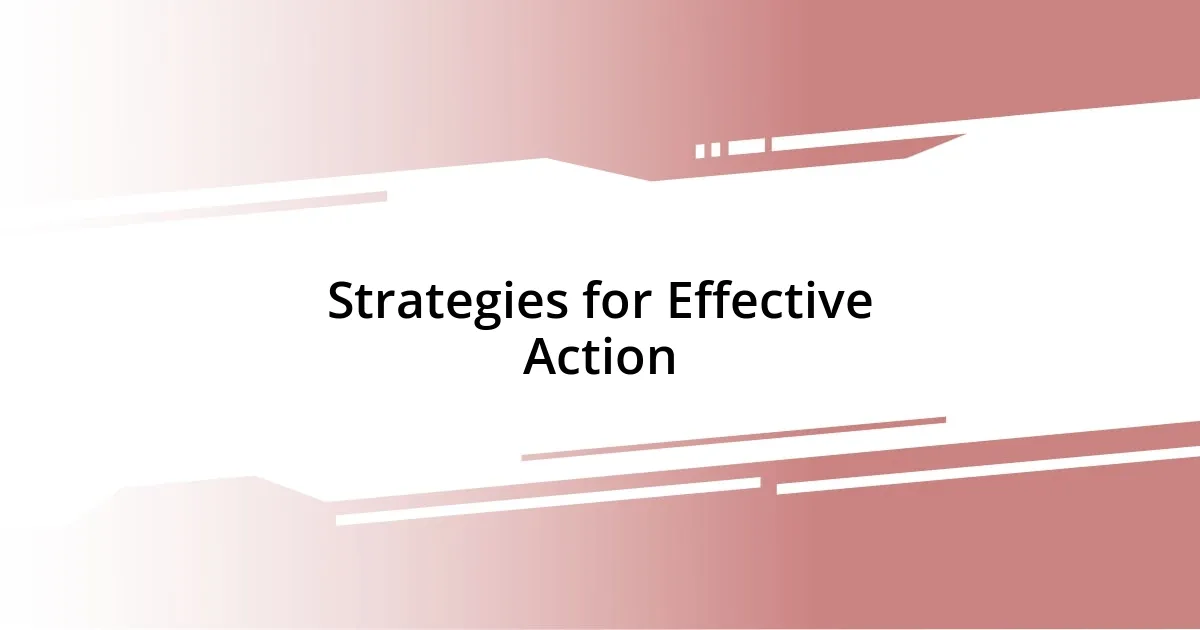
Strategies for Effective Action
Taking effective action is all about finding the sweet spot between momentum and mindfulness. I’ve learned that setting clear, achievable goals helps channel my energy in the right direction. For example, when I decided to train for a marathon, I broke down my training schedule into manageable weekly runs. Each small step gave me not only the confidence to keep going but also the satisfaction of seeing progress on my journey.
Here are some strategies that work well for me:
- Set Specific Goals: Outline what you want to achieve and establish clear timelines.
- Break It Down: Divide larger tasks into smaller, actionable steps to make progress more manageable.
- Prioritize: Focus on what matters most to keep from getting overwhelmed.
- Embrace Imperfection: Understand that action doesn’t have to be flawless. Mistakes are opportunities to learn.
- Maintain Accountability: Share your goals with someone who can support and encourage you along the way.
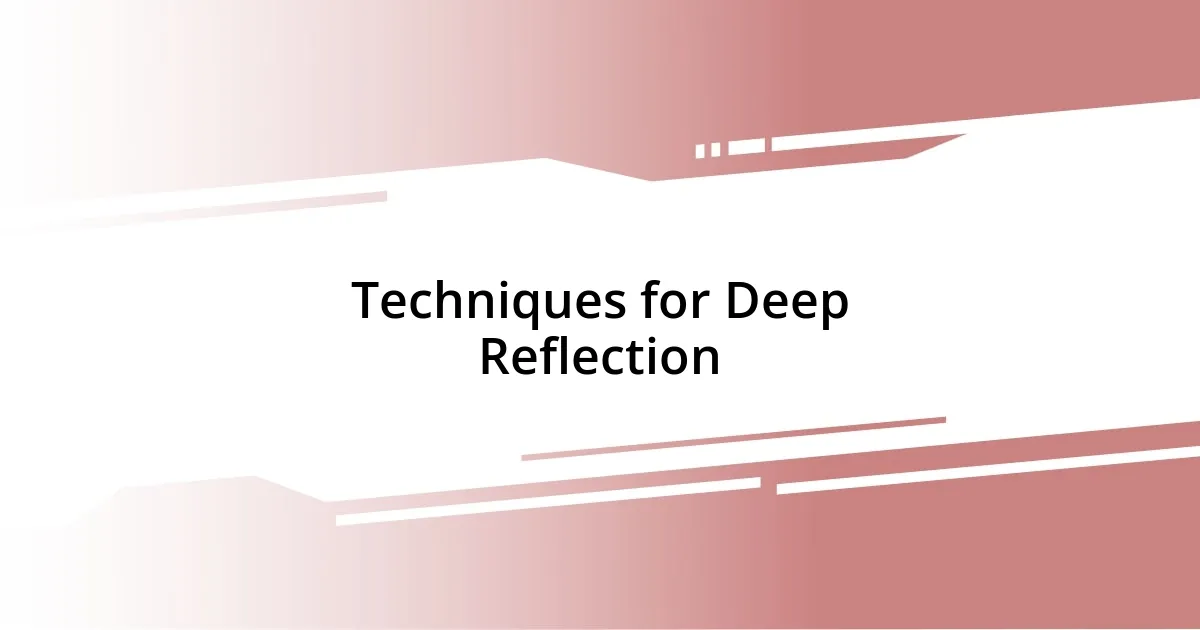
Techniques for Deep Reflection
Thinking deeply about my experiences can really change how I approach life. One technique I find powerful is journaling. Reflecting on my day, thoughts, and feelings helps me understand patterns and emotions I might otherwise overlook. When I jot down my thoughts, it feels like I’m having a conversation with myself. Have you ever tried this? It’s almost like getting to know yourself better.
Another technique I’ve embraced is mindfulness meditation. By sitting quietly and focusing on my breath, I create space for my thoughts to settle. I remember one particular session where a flood of ideas emerged about a project I had abandoned. It brought insight and clarity I hadn’t expected. This practice has helped me uncover deeper meanings in my experiences and decisions, leading me to invaluable realizations.
Finally, engaging in discussions with others can deepen reflection. Conversations about challenges or decisions can spark new perspectives. I often find that my friends provide insights I’d never considered. It’s like having a sounding board for my ideas and thoughts. Do you seek feedback from others? I encourage you to share your reflections; it might lead to surprising insights!
| Technique | Description |
|---|---|
| Journaling | A personal way to explore thoughts and feelings, creating clarity through written reflection. |
| Mindfulness Meditation | A practice of focusing on the present moment to help settle the mind and promote deeper understanding. |
| Engaging Discussions | Conversing with others to gain diverse perspectives on experiences and thoughts, enhancing reflective insights. |
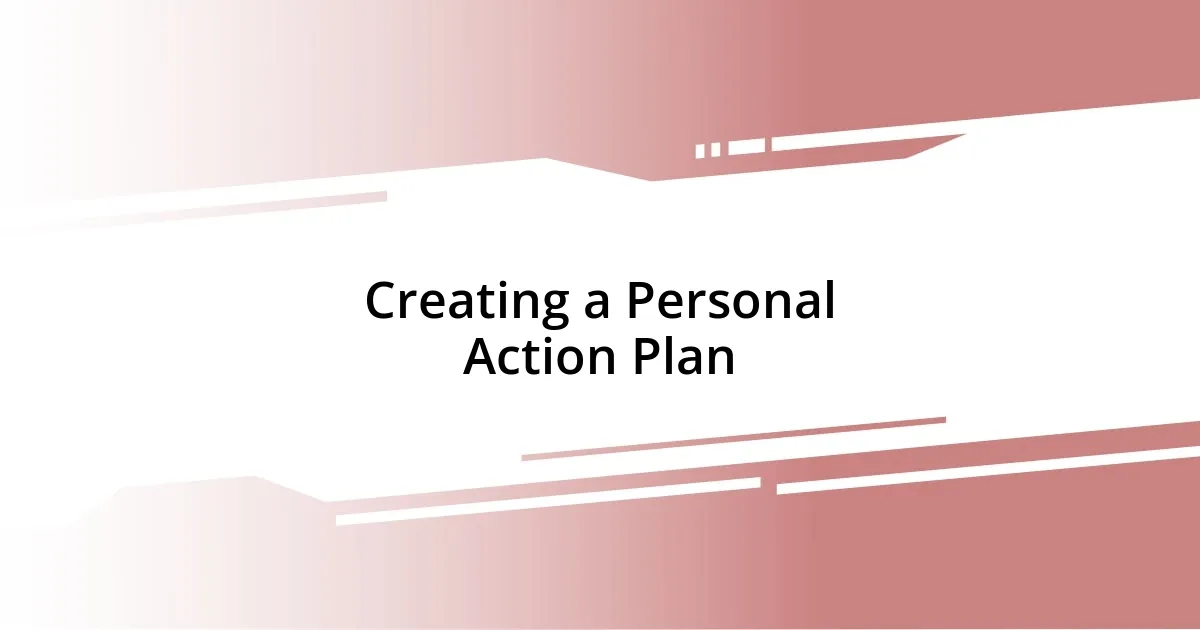
Creating a Personal Action Plan
Creating a personal action plan starts with identifying what truly matters to you. I remember when I sat down to outline my career goals; it felt daunting at first. However, once I started jotting down what success looked like for me, everything became clearer. Have you ever experienced that moment when your aspirations finally align? It was liberating.
Next, I emphasize the importance of flexibility in your action plan. Life will throw curveballs, and I’ve learned to adapt rather than stick rigidly to a set path. For instance, while training for that marathon, an unexpected knee injury forced me to revise my running schedule. Instead of feeling defeated, I took it as a chance to focus on cross-training, which ultimately made me a stronger runner. Isn’t it fascinating how setbacks can lead to unexpected growth?
Lastly, celebrate your milestones, no matter how small. Each time I completed a weekly goal in my training, I took a moment to acknowledge it—whether that meant enjoying a favorite treat or sharing my success with friends. Recognizing progress nurtures motivation and reinforces the habit of action. How do you reward yourself for staying on track? Finding joy in the journey is just as vital as reaching the destination.
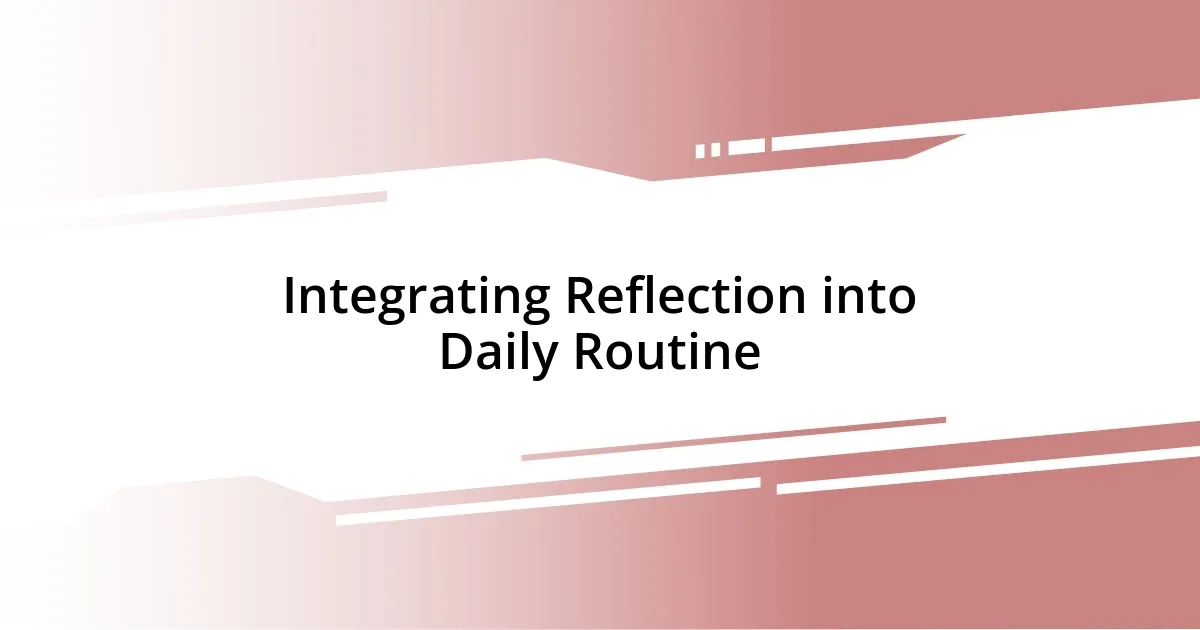
Integrating Reflection into Daily Routine
Integrating reflection into my daily routine has been transformative. I’ve made it a habit to carve out a brief moment after lunch for quiet reflection. During this time, I reflect on the morning; I think about what went well and what I could improve. It’s like turning the page of a book, allowing me to see the narrative of my day unfold.
In the evenings, I dedicate a few minutes to value my experiences further. I sit with a cup of tea, replaying the day in my mind. One night, I realized I had brushed off a client’s concerns too quickly. I felt regret, but acknowledging it encouraged me to reach out and offer an apology the next day. Have you ever let a small misstep linger? Accepting our mistakes can set the stage for growth.
On weekends, I enjoy a lengthier, more in-depth reflection session. I sometimes take a walk in nature to really soak in my thoughts. The tranquility of my surroundings helps me think deeply about my week, connecting the dots between my actions and outcomes. One weekend, I vividly recall being struck by how I neglected self-care while focusing on work. This realization sparked a commitment to prioritize balance. Isn’t it interesting how nature can guide our reflections?
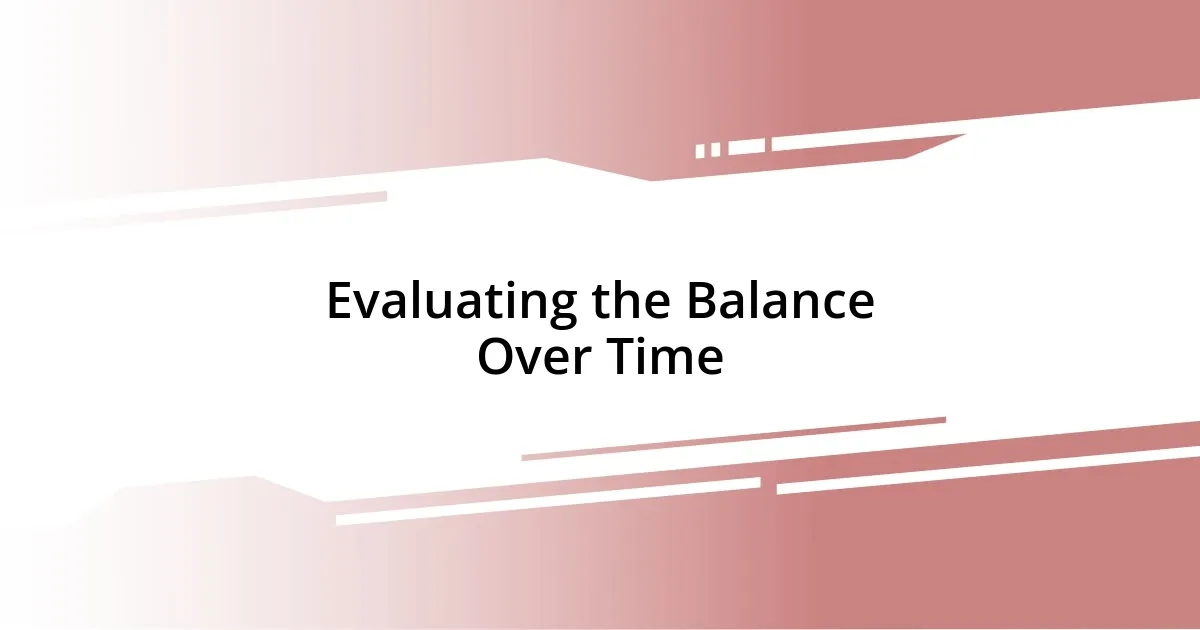
Evaluating the Balance Over Time
Evaluating the balance between action and reflection is not a one-time task; it’s an ongoing journey. Over the months, I’ve found myself reassessing how well I’m managing both aspects. There have been times when I was so caught up in my to-do list that I didn’t pause to think about what I was truly achieving. Do you ever lose sight of your bigger goals in the hustle?
One day, amidst a particularly busy period at work, I realized I hadn’t reflected deeply in weeks. I set aside a Saturday afternoon just for this, and revisiting my notes revealed patterns I had missed. I noticed that while I was checking off tasks, I wasn’t aligning those actions with my core values. This epiphany made me wonder: how often do we operate on autopilot without checking in with ourselves?
As I’ve continued this practice, I’ve also learned to celebrate my progress. I keep a journal where I not only track my actions but also jot down reflections on those actions. Looking back over several months, I felt a surge of encouragement when I saw how far I’d come. In those moments, I ask myself: what parts of my journey made me feel the most fulfilled? Reflecting like this continually motivates me to maintain that balance.







